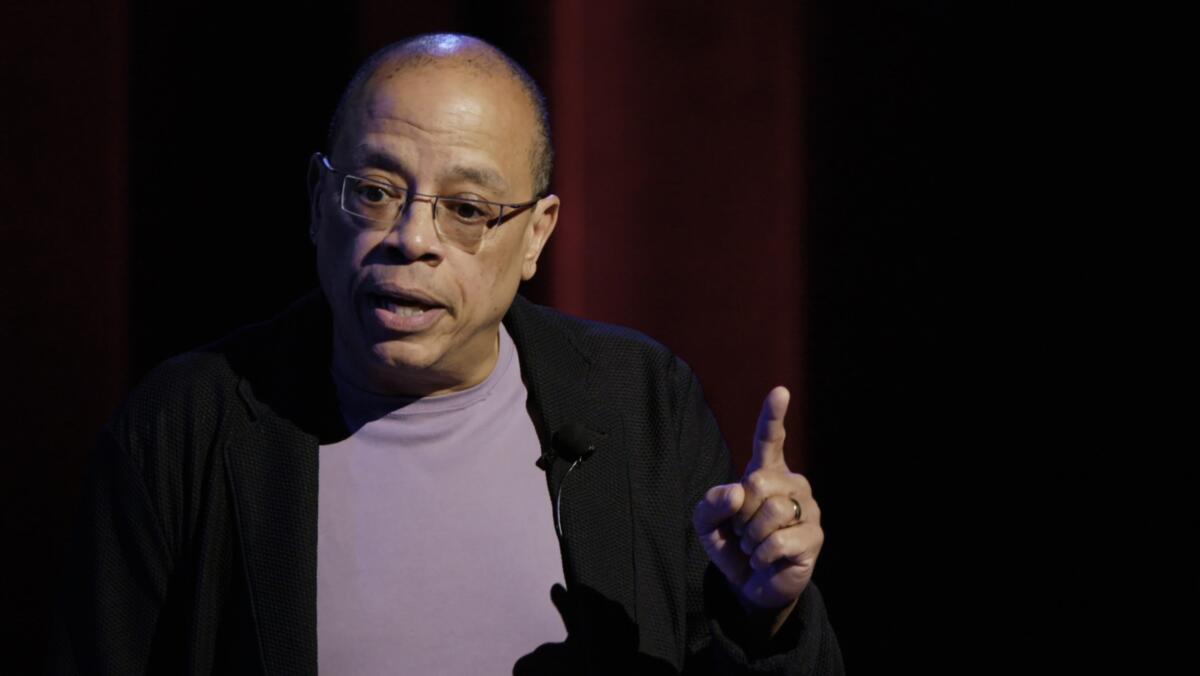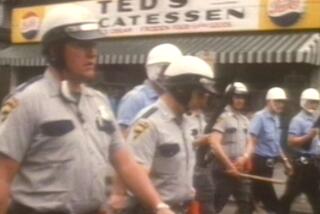Review: ‘Who We Are: A Chronicle of Racism in America’ imparts powerful lessons

- Share via
The Times is committed to reviewing theatrical film releases during the COVID-19 pandemic. Because moviegoing carries risks during this time, we remind readers to follow health and safety guidelines as outlined by the Centers for Disease Control and Prevention and local health officials.
There’s a moment in co-directors Emily and Sarah Kunstler’s searing documentary “Who We Are: A Chronicle of Racism in America” that, with greater thought, haunts the viewer to unfathomable ends. The film’s host, Jeffery Robinson, the former deputy legal director of the American Civil Liberties Union, is touring the Old Slave Mart Museum in Charleston, S.C., a place where the enslaved were prepared for the auction block.
He and Ista Clarke, the operations manager of the museum, come across a life-size photo of an enslaved Black man and adolescent girl. The camera slowly tilts down the image of their bodies, taking notice of their tattered clothes, until it finally settles at their feet, where rusted, antique shackles, one being child-sized for the girl, rest.
Imagine a system so finely tuned, that it comes with chains measured to the exact specifications needed to trap children. Such an industry didn’t emerge overnight. In fact, in the nearly 150 years since the abolition of slavery, those cold mechanizations used by white supremacists in America have only become more precise. “Who We Are,” a revelatory, albeit stiff documentary, anchored by Robinson’s personal anecdotes and footage of his 2018 lecture at New York City’s Town Hall Theater, uncovers startling research while surveying the country’s unimaginable racial crimes.
Robinson’s meticulous presentation at Town Hall Theater is the result of a ruminative journey he began when he struggled to explain to his then-13-year-old nephew about race in America. Robinson explains to the packed auditorium how he sees history as a series of inflection points. For him, the Rev. Martin Luther King Jr.’s 1968 assassination is one such moment where the fortunes of an entire race changed.
While Robinson offers a passionate, engaging onstage energy, he can’t overcome the staid trappings of the lecture format. The pacing languishes under the academic weight of slides and facts and figures. Rather his field work, when he ventures to different states to study the visible links to our living archive, beats with a stronger pulse.
By visiting the New York Cotton Exchange building, wherein slave owners received insurance on the enslaved, the film destroys the unfounded myth of slavery as solely a Southern problem.
Robinson also meets with Mother Lessie Benningfield Randle, a 107-year old survivor of the Tulsa Massacre and speaks with Eric Garner’s mother, Gwen Carr. In discussing the violence perpetrated against African Americans, both women offer potent, harrowing memories. Copious videos of police violence against Black folks adorn the film. Though Emily and Sarah Kunstler thoughtfully cut these clips short of their most gruesome seconds, these images come with a major trigger warning.
But Robinson’s best, most tender teachings arise from his personal anecdotes: How his parents navigated the redlining practices of Memphis, the aggressions he faced as St. Louis Catholic High School’s first Black student, and the day when a local African American teenager, Larry Payne, died at the hands of police, while Robinson and his father marched with King just days before MLK’s assassination.
Payne’s still-grieving adult sister, Carolyn, reveals to Robinson the coldblooded apathy white authorities used to murder her brother. Their acute talk, contextualized by the haunting archival footage, vividly restored, of Payne’s limp body carried on a stretcher, thematically recalls the child’s shackles, or how white supremacists dehumanize Black people from womb to tomb.
Through Robinson’s fervor for truth, Emily and Sarah Kunstler’s “Who We Are” chronicles how such heartaches, when observed on a personal level, remind us how knowing the unchangeable past can still improve the alterable future for the better. This film should be shown in every classroom.
'Who We Are: A Chronicle of Racism in America'
Rated: PG-13 for thematic content, disturbing images, violence and strong language, all involving racism
Running time: 1 hour, 57 minutes
Playing: Starts Jan. 14, AMC the Grove 14, Los Angeles; the Landmark, West Los Angeles
More to Read
Only good movies
Get the Indie Focus newsletter, Mark Olsen's weekly guide to the world of cinema.
You may occasionally receive promotional content from the Los Angeles Times.










